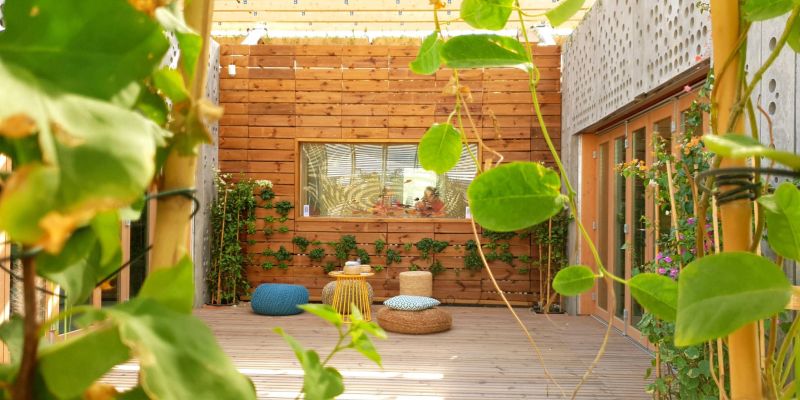COURSES

Sustainable and Experimental Student Housing Living Lab
Student housing is at the heart of present and future societal issues. It must meet the generic requirements of sustainable building standards (energy performance, space evolutivity, life cycle, building and maintenance decarbonization, water and energy management, urban densification…), adapt to the evolving educational formats (remote work and classes, hybrid attendance), and anticipate the new ways of living as the transition from student to young professional status lengthens.
About the course
Content
In this course, we use the “BKinACT living lab” as a study case to challenge students to design creative technological and housing solutions that can be adapted to the various contexts of ENLIGHT partner universities, thanks to the students’ achievements in acquiring and integrating transdisciplinary skills.
The prototype is currently in its second stage of design before the beginning of manufacturing, which makes the Enlight programme students’ contributions all the more interesting for the proposal of various solutions to the challenge.
- The course consists of lectures provided by local and international partners of the ENLIGHT network, as well as external experts spanning key aspects related to building sustainability, innovation, and student housing challenges.
- Each lecture is associated with a mini-challenge to keep the students engaged during the remote sessions and build up knowledge in preparation for the immersive week in Bordeaux.
- Students work together in multidisciplinary and multicultural teams to come up with transversal solutions regarding experimental and sustainable student housing.
- The immersive week will mark the final stretch for the challenge-based learning experience, as the students will be able to visit the living lab’s site, meet with local experts to nuance their answers to the challenge, and deepen the social ties within the team.
Learning outcomes
- Acquire the ability to provide crossdisciplinary and multiscalar perspectives when tackling a complex challenge;
- Channel creativity and innovation, as the experimental prototype design is the perfect opportunity to think outside the box;
- Learn about new ground-breaking technologies and innovation in the building industry and green economy;
- Becoming aware of the big picture societal factors that influence people’s inhabiting behaviors and choices;
- Learn how to simplify and share expert knowledge between team members;
- Learn how to negotiate and defend one’s proposal to the group solution, and keep an open mind towards the teammates' feedback.
Programme
1. Building blocks online:
During the first 8 weeks: weekly sessions to introduce the mission’s context and the first themes of the session with their related mini-challenges (biosourced and geo-sourced materials, building system, energy performance, water management, etc.):
- 2/3 of the sessions will focus on technological knowledge
- 1/3 on societal issues regarding student residential trajectories and needs.
These “learning capsules” will be led by lecturers from the different institutions of the ENLIGHT consortium and experts.
2. Immersion week (November 28th - December 2nd):
Students will gather in person at the University of Bordeaux in teams that were previously formed during the remote sessions to elaborate on a solution to one of the challenges that emerge from the “BKinACT” case study. For each case study, we will try to discover an innovative sector:
- the manufacturing in an industrial site
- the various scenarios of innovation
- finally, the implementation on a real building project.
Among the many potential avenues of challenge regarding experimental and sustainable student housing: energy management, recycling, water cycle, building’s biological system, materials, health and well-being, co-working / co-living dynamics, residential trajectories, etc. Each challenge topic will be necessarily investigated with a cross-disciplinary approach.
3. Final action:
Delivery of a report and a final on-site presentation. Creative formats of presentations are encouraged.
Assessment
- Continuous assessment related to the weekly attendance and work on the mini-challenges;
- Participation in the live sessions and teaching activities;
- Peer assessment of the presentation and oral examination during the immersive week;
- Participation in the immersive week and the on-site activities;
- Delivery of a collective team report regarding the proposal;
- Writing a self-assessment/reflexive short paper regarding the main teachings the student got from the course.
Lecturers
Suggested thematics (lecture + mini-challenge related to experimental & sustainable student housing):
- Innovative use of bio-sourced materials in architecture
- Building-integrated technology
- Ecodesign and design of materials
- Sustainable management of water
- Biodiversity in an urban habitat
- Waste treatment and management
- Community-led management (i.e. co-ownership)
- Spatial appropriation and practices (relate it to the student community)
- Eco-conscious behaviors implementation (sociology, psychology, policy reinforcement, etc.)
- Environmental governance and policy
- Artificial Intelligence
How to apply?
Selection criteria:
- 5 students/university
- Master's degree year 2 in 2022-2023
- B2 level in English
This course is open to all study fields. We encourage especially students from these study fields to apply:
- Civil, Environmental, Mechanical, and Process Engineering
- Sociology, Psychology, and Politics
- Computer Science and Artificial Intelligence
- Architecture
- Material Science
Application deadline: 30 June 2022 - eligible Erasmus+ mobility
Students from Uppsala University, please apply using the Move-On application tool
Contact
For information and application, please contact the general ENLIGHT email address of your home institution: